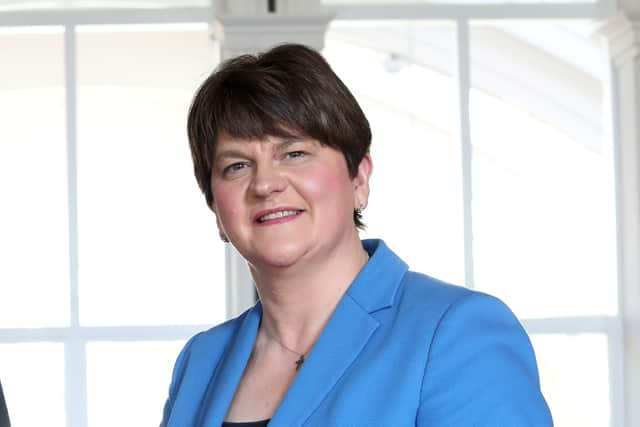Arlene Foster tells GB News how she’s thankful her children aren’t growing up in the same violent Northern Ireland she did
and live on Freeview channel 276
She recalled an incident when her father, a police officer, was attacked by the IRA in an incident which led to the family having to move home.
Speaking about her childhood, and how it inspired her move into politics Mrs Foster told GB News: “I was always interested in politics and history and because of what happened to my father.
Advertisement
Hide AdAdvertisement
Hide Ad"But I really got involved in politics when I went to University in Belfast. I got involved with student politics and then went into mainstream politics after that. So it has always been about politics, about advocating for the United Kingdom and for parts of the UK to stay together and so it remains today.


"I was born in 1970, which was just at the beginning of the Troubles and because I was a child of a police officer, violence did come to my door. And when I look back now, I had a very happy childhood but it wasn't a normal childhood, obviously because you were living through violence.
"You were living through the news every evening that someone had been killed in an attempted murder. So it was really an abnormal time.
"I'm very thankful that my children don’t have to grow up with that background. Now, when someone is attacked, it's a very big story because it doesn't happen very often and that's good because we want to eradicate it completely.”
Advertisement
Hide AdAdvertisement
Hide AdMrs Foster also spoke about her time as the first female First Minister of Northern Ireland.
“So there were quite a few females around the time, actually. I hadn't realised how important it was for young women - to look and see a woman in that position until I stepped down.
"And when I stepped down, I received numerous correspondence from young women saying, we were really glad to see a woman in that position, that has inspired us to get involved in whatever they were involved in. And that's really inspiring.
“It's really encouraging to me that younger women have gone on and said, well, thank you for doing that because now we're getting involved, or we're going to be doing that job. It was tough being the leader of Northern Ireland, but I loved being an advocate for Northern Ireland and telling the world what it was.”
Advertisement
Hide AdAdvertisement
Hide AdOpening up on the biggest challenges she added: “But there were many, many challenges in the system of government we have in Northern Ireland, where all of the parties are actually in the Executive, it made it difficult to find common ground and so we spend most of our time every day negotiating to try and find that common ground.
"So it can be exhausting, but it was something I felt very proud of doing. It was an honour to do it as well and it was fulfilling at times but very, very challenging.”